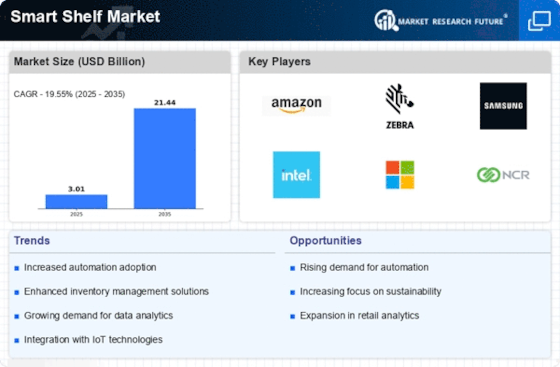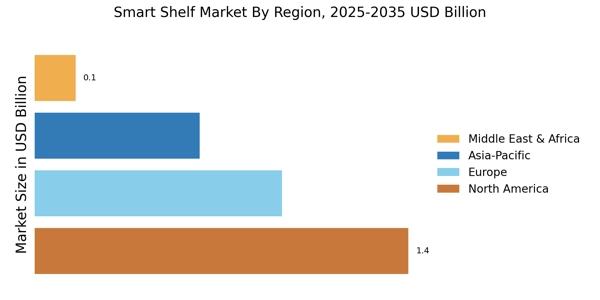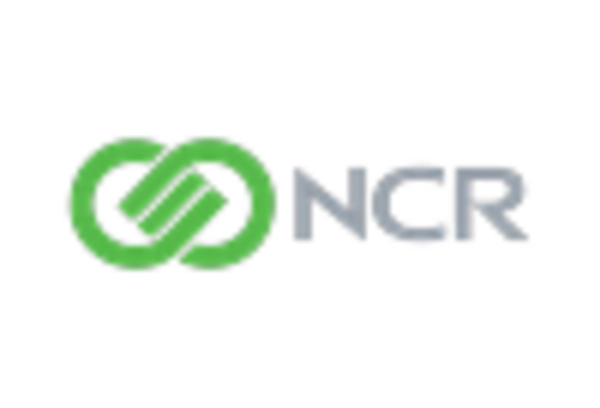Growth of E-commerce
The Smart Shelf Market is poised to gain momentum from the rapid expansion of e-commerce platforms. As online shopping continues to proliferate, retailers are compelled to adopt innovative solutions to manage inventory effectively and meet consumer demands. The e-commerce sector has witnessed a remarkable increase, with sales projected to reach over 6 trillion dollars by 2024. This growth necessitates the implementation of smart shelf technologies that provide real-time data on stock levels and product availability. By leveraging smart shelves, e-commerce businesses can enhance their inventory accuracy and improve customer satisfaction. Thus, the Smart Shelf Market stands to benefit significantly from the ongoing evolution of e-commerce, as retailers seek to integrate advanced technologies to remain competitive.
Focus on Sustainability
Sustainability has emerged as a pivotal concern within the Smart Shelf Market, as businesses increasingly prioritize eco-friendly practices. The demand for sustainable solutions is driving the adoption of smart shelves that optimize inventory management and reduce waste. Companies are recognizing the importance of minimizing their environmental footprint, and smart shelf technologies can contribute to this goal by ensuring that products are sold before expiration and reducing overstock situations. Recent studies indicate that businesses implementing sustainable practices can enhance their brand image and attract environmentally conscious consumers. As a result, the Smart Shelf Market is likely to see a rise in demand for solutions that align with sustainability objectives, reflecting a broader trend towards responsible consumption.
Rising Demand for Automation
The Smart Shelf Market is experiencing a notable surge in demand for automation solutions across various sectors, particularly retail and logistics. As businesses strive to enhance operational efficiency, the integration of smart shelves allows for real-time inventory management and streamlined supply chain processes. According to recent data, the automation segment within the retail sector is projected to grow at a compound annual growth rate of approximately 15% over the next five years. This trend indicates a shift towards more technologically advanced solutions, as companies seek to reduce labor costs and minimize human error. Consequently, the Smart Shelf Market is likely to benefit from this growing inclination towards automation, as retailers and warehouses increasingly adopt smart shelf technologies to optimize their operations.
Increasing Consumer Expectations
The Smart Shelf Market is responding to the rising expectations of consumers for seamless shopping experiences. As customers demand greater convenience and personalization, retailers are compelled to adopt technologies that enhance the shopping journey. Smart shelves play a crucial role in meeting these expectations by providing real-time information about product availability and facilitating quicker checkouts. Recent surveys indicate that over 70% of consumers prefer shopping experiences that incorporate technology for ease and efficiency. This shift in consumer behavior is prompting retailers to invest in smart shelf solutions that cater to these demands. Consequently, the Smart Shelf Market is likely to witness growth as businesses strive to align their offerings with evolving consumer preferences.
Advancements in Sensor Technology
The Smart Shelf Market is significantly influenced by advancements in sensor technology, which enhance the functionality and efficiency of smart shelves. Innovations in sensors enable real-time tracking of inventory levels, product conditions, and customer interactions. This technological evolution allows retailers to gather valuable data that can inform decision-making processes and improve customer experiences. The integration of advanced sensors is expected to drive the smart shelf market, with estimates suggesting a growth rate of around 12% annually over the next few years. As businesses increasingly recognize the value of data-driven insights, the Smart Shelf Market is likely to expand, driven by the demand for more sophisticated sensor technologies that facilitate better inventory management.


















